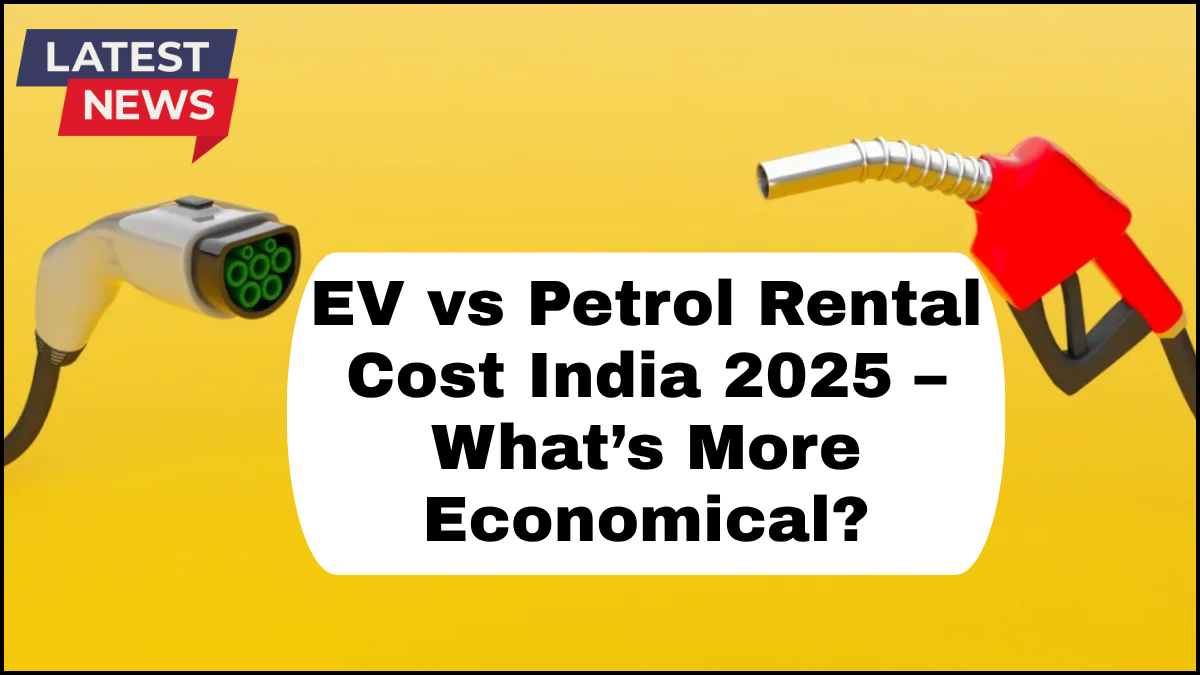In 2025, with fuel prices fluctuating and electric vehicle (EV) adoption accelerating, many Indian consumers are re-evaluating how they rent cars. One pressing question stands out: EV vs Petrol Rental Cost 2025 – what offers better value for money? Let’s break down the costs, benefits, and trade-offs to see which type of rental vehicle makes more financial sense this year.

Rental Rates: EVs vs Petrol Cars
EV Rental Price Comparison shows a closing gap between electric and petrol vehicle rental rates in India. As of mid-2025:
- Electric car rentals start at around ₹1,000/day for compact models like the Tata Tiago EV or MG Comet.
- Petrol car rentals, such as a Maruti Swift or Hyundai i10, start at ₹900-₹1,200/day depending on city and demand.
While entry-level pricing may appear similar, EVs often come bundled with charging credits or discounts, tipping the scale toward cost-effectiveness in urban areas.
Charging vs Fuel Costs
A major factor influencing EV vs Petrol Rental Cost 2025 is the ongoing operational cost:
- EV Charging Costs: Charging an EV at a public fast-charger costs roughly ₹200-₹300 for a full charge, offering 150-300 km range depending on the model.
- Petrol Fuel Costs: With petrol prices hovering around ₹110/litre, a full tank (35-45 litres) costs ₹3,850-₹4,950, offering 400-600 km range.
For shorter city rides or moderate distances, EVs emerge as significantly cheaper to operate, especially where free or discounted charging stations are available.
Availability and Accessibility
The availability of rental EVs is growing rapidly across India, especially in metro cities like Bangalore, Delhi, Mumbai, and Hyderabad. Companies like Zoomcar, Revv, BluSmart, and Drivezy have added multiple EV models to their fleets.
However, rural and tier-2 cities still see greater petrol car availability, which affects convenience and may influence your choice based on location.
Maintenance and Hidden Costs
EVs benefit from lower maintenance needs since they have fewer moving parts. Rental companies pass these savings to customers via reduced security deposits or fewer service charges.
Petrol cars, while familiar, involve more frequent servicing, oil changes, and higher wear-and-tear risks. Over a multi-day rental, these factors can drive up overall costs, even if the base rental fee is marginally lower.
Range Anxiety and Charging Infrastructure
A legitimate concern in the EV rental price comparison is range anxiety. Though India now boasts over 12,000 public charging stations (as of 2025), the distribution remains skewed toward major cities.
Petrol cars, in contrast, benefit from a dense and well-established fuel station network, making them more reliable for inter-city or long-distance trips.
Government Incentives and Tax Benefits
Several state governments are incentivizing EV rentals with subsidies and GST waivers. For instance:
- Delhi and Maharashtra offer incentives for EV-based mobility services.
- Reduced toll charges and green vehicle badges increase access and cut costs.
These perks directly reduce total rental expenses for EV users.
Sustainability and Brand Perception
For eco-conscious renters, EVs clearly win. Choosing electric helps reduce carbon footprint and aligns with India’s larger sustainability goals. Also, companies are increasingly using EV fleets for last-mile deliveries and employee transport, enhancing brand image.
Final Verdict: EV or Petrol Rental in 2025?
If you’re renting a car within city limits or for short distances, EVs are more economical overall. Their lower running cost, minimal maintenance, and bundled benefits outweigh the slightly higher upfront rental price.
However, if you’re planning a long-distance trip through regions with limited charging access, petrol vehicles may still be more practical.
Ultimately, the decision comes down to use-case, route, and personal preference.
Frequently Asked Questions (FAQs)
Q1. Are electric car rentals cheaper than petrol in India in 2025?
Yes, for short-term and city usage, EV rentals are typically cheaper due to lower fuel (charging) costs and fewer maintenance-related charges.
Q2. What is the average EV rental cost per day in India?
Most EV rentals range from ₹1,000 to ₹1,500 per day, depending on model and location.
Q3. Is charging included in EV rental costs?
Some rental services offer free or discounted charging packages. Always confirm with the provider before booking.
Q4. Are EVs available for intercity travel rentals?
Yes, but availability and charging infrastructure should be checked in advance. Some companies also offer portable chargers or route-specific support.
Q5. Do electric vehicles require a different license or training?
No. A standard Indian driving license is sufficient to rent and drive an EV.
click here to learn more